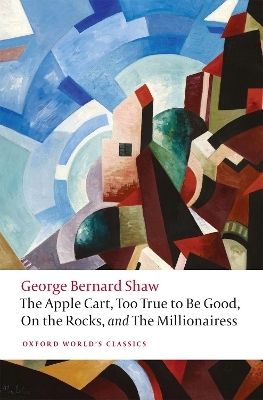
The Apple Cart, Too True to Be Good, On the Rocks, and The Millionairess
Seiten
2021
Oxford University Press (Verlag)
978-0-19-880994-4 (ISBN)
Oxford University Press (Verlag)
978-0-19-880994-4 (ISBN)
The Apple Cart, Too True to Be Good, On the Rocks, and The Millionairess is a collection of four of George Bernard Shaw's most interesting plays. They stretch from 1929 to 1935 and coincide with the Great Depression.
The four dramas in this volume are some of George Bernard Shaw's most interesting plays. They stretch from 1929 to 1935 and coincide with the Great Depression, the intensification of the crisis of democracy that began after the war, and the rise of totalitarianism, all of which find expression in these plays. They also signal the beginning of an important new phase in Shaw's writing, one marked especially by the development of two new Shaw genres: the political extravaganza and the political allegory.
The Apple Cart (1929) marked Shaw's return to playwriting after the long hiatus that followed Saint Joan (1923). The Apple Cart is perhaps the most pointed critique of parliamentary democracy in the entire Shavian canon.
Too True to Be Good (1931) is another 'political extravaganza', with the opening stage direction -- 'The patient is sleeping heavily. Near her, in the easy chair, sits a Monster' ---signaling that Shaw is advancing further into uncharted dramaturgical territory. He began writing shortly before his trip to the Soviet Union and finished the play and wrote the preface after his return. In the preface Shaw asserts that the USSR is a new Catholic church.
The dark mood continues in Shaw's next play, On the Rocks (1933) which Shaw subtitled, 'a political comedy'. It is reminiscent of The Apple Cart in that it is sharply focused on British politics and set in the Cabinet Room at 10 Downing Street during the economic depression of the 1930s.
Shaw started writing The Millionairess in 1934 and finished it in 1935. On the surface, it is a simple comedy, and if not for the preface we might acquiesce to Shaw's assessment that the play 'oes not pretend to be anything more than a comedy of humorous and curious contemporary characters such as Ben Jonson might write'. Yet the preface appended to the play is entirely about leadership and declaims at great length on Mussolini and Hitler.
The four dramas in this volume are some of George Bernard Shaw's most interesting plays. They stretch from 1929 to 1935 and coincide with the Great Depression, the intensification of the crisis of democracy that began after the war, and the rise of totalitarianism, all of which find expression in these plays. They also signal the beginning of an important new phase in Shaw's writing, one marked especially by the development of two new Shaw genres: the political extravaganza and the political allegory.
The Apple Cart (1929) marked Shaw's return to playwriting after the long hiatus that followed Saint Joan (1923). The Apple Cart is perhaps the most pointed critique of parliamentary democracy in the entire Shavian canon.
Too True to Be Good (1931) is another 'political extravaganza', with the opening stage direction -- 'The patient is sleeping heavily. Near her, in the easy chair, sits a Monster' ---signaling that Shaw is advancing further into uncharted dramaturgical territory. He began writing shortly before his trip to the Soviet Union and finished the play and wrote the preface after his return. In the preface Shaw asserts that the USSR is a new Catholic church.
The dark mood continues in Shaw's next play, On the Rocks (1933) which Shaw subtitled, 'a political comedy'. It is reminiscent of The Apple Cart in that it is sharply focused on British politics and set in the Cabinet Room at 10 Downing Street during the economic depression of the 1930s.
Shaw started writing The Millionairess in 1934 and finished it in 1935. On the surface, it is a simple comedy, and if not for the preface we might acquiesce to Shaw's assessment that the play 'oes not pretend to be anything more than a comedy of humorous and curious contemporary characters such as Ben Jonson might write'. Yet the preface appended to the play is entirely about leadership and declaims at great length on Mussolini and Hitler.
Matthew Yde is Visiting Assistant Professor in the Department of Theatre and Dance at the University of New Mexico, USA. He specialises in modern and contemporary theatre and drama, particularly in relation to politics, philosophy, and religion. His most recent work includes Bernard Shaw and Totalitarianism (Palgrave Macmillan).
Introduction
Select Bibliography
Chronology
The Apple Cart
Too True to Be Good
On the Rocks
The Millionairess
Explanatory Notes
| Erscheinungsdatum | 02.07.2021 |
|---|---|
| Reihe/Serie | Oxford World's Classics |
| Verlagsort | Oxford |
| Sprache | englisch |
| Maße | 130 x 197 mm |
| Gewicht | 364 g |
| Themenwelt | Literatur ► Lyrik / Dramatik ► Dramatik / Theater |
| Geisteswissenschaften ► Sprach- / Literaturwissenschaft ► Literaturwissenschaft | |
| ISBN-10 | 0-19-880994-8 / 0198809948 |
| ISBN-13 | 978-0-19-880994-4 / 9780198809944 |
| Zustand | Neuware |
| Informationen gemäß Produktsicherheitsverordnung (GPSR) | |
| Haben Sie eine Frage zum Produkt? |
Mehr entdecken
aus dem Bereich
aus dem Bereich


